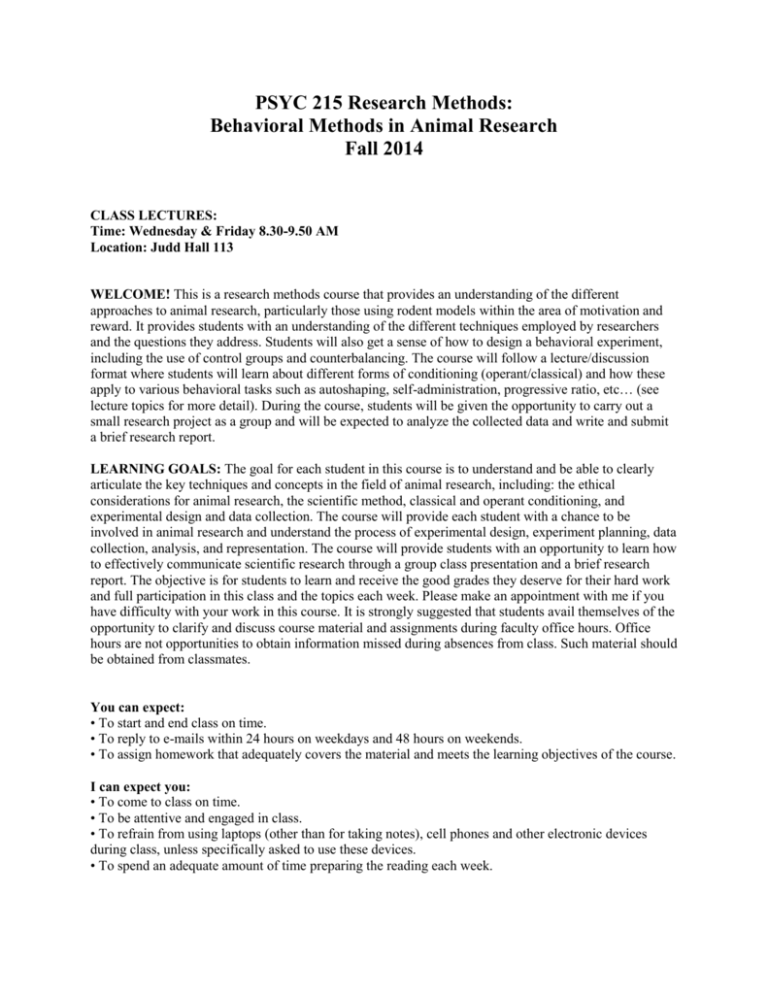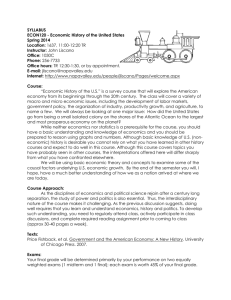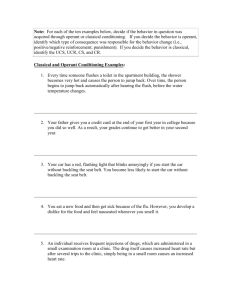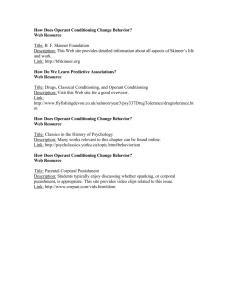Behavioral Methods in Animal Research Fall 2014
advertisement

PSYC 215 Research Methods: Behavioral Methods in Animal Research Fall 2014 CLASS LECTURES: Time: Wednesday & Friday 8.30-9.50 AM Location: Judd Hall 113 WELCOME! This is a research methods course that provides an understanding of the different approaches to animal research, particularly those using rodent models within the area of motivation and reward. It provides students with an understanding of the different techniques employed by researchers and the questions they address. Students will also get a sense of how to design a behavioral experiment, including the use of control groups and counterbalancing. The course will follow a lecture/discussion format where students will learn about different forms of conditioning (operant/classical) and how these apply to various behavioral tasks such as autoshaping, self-administration, progressive ratio, etc… (see lecture topics for more detail). During the course, students will be given the opportunity to carry out a small research project as a group and will be expected to analyze the collected data and write and submit a brief research report. LEARNING GOALS: The goal for each student in this course is to understand and be able to clearly articulate the key techniques and concepts in the field of animal research, including: the ethical considerations for animal research, the scientific method, classical and operant conditioning, and experimental design and data collection. The course will provide each student with a chance to be involved in animal research and understand the process of experimental design, experiment planning, data collection, analysis, and representation. The course will provide students with an opportunity to learn how to effectively communicate scientific research through a group class presentation and a brief research report. The objective is for students to learn and receive the good grades they deserve for their hard work and full participation in this class and the topics each week. Please make an appointment with me if you have difficulty with your work in this course. It is strongly suggested that students avail themselves of the opportunity to clarify and discuss course material and assignments during faculty office hours. Office hours are not opportunities to obtain information missed during absences from class. Such material should be obtained from classmates. You can expect: • To start and end class on time. • To reply to e-mails within 24 hours on weekdays and 48 hours on weekends. • To assign homework that adequately covers the material and meets the learning objectives of the course. I can expect you: • To come to class on time. • To be attentive and engaged in class. • To refrain from using laptops (other than for taking notes), cell phones and other electronic devices during class, unless specifically asked to use these devices. • To spend an adequate amount of time preparing the reading each week. • To be respectful towards other students at all times, particularly during discussions and when working in a team setting. • To be responsible and reliable when doing any animal or lab work. • To seek help when appropriate. INSTRUCTOR: Mike Robinson PhD Office: 003 Judd Hall Office Hours: Tuesdays 1-3 PM or by appointment Phone: 860-685-3243 Email: mjrobinson@wesleyan.edu LECTURE TOPICS (some topics may span several classes): - Course structure and expectations - Ethical considerations in animal research - Scientific Method - Animal Training Workshop - Introduction to the lab and general rules - Handling techniques – Hands-on workshop - Group assignment and project description - Experimental Design: How to prepare for an experiment - Control groups and counterbalancing - Motivation, Learning & Reward - Conditioned vs. Unconditioned behaviors - Pavlovian/Classical Conditioning - Skinnerian/Operant Conditioning - Techniques: Optogenetics - Data collection and analysis - Scientific writing - Writing a research report EXAM SCHEDULE: Midterm I: October 15th, 2014 Midterm II: December 5th, 2014 READINGS: Readings will be based on scientific research articles, and will include some of the early or initial papers for each behavioral method (e.g. Ivan Pavlov's description of Classical Conditioning). Students are expected to do the assigned readings prior to each and every class and to come prepared to discuss the material and the concepts. No textbook is required for the course and readings will be posted on Moodle. COURSE REQUIREMENTS AND GRADING: Students are required to attend regular class lectures and discussions. Assessment consists of two exams involving multiple choice and short answer questions (based on lecture notes, readings and class discussion), and a research project assignment requiring students to carry out an experiment as a group and write up their results individually in the form of a brief research report (see below). Students must take all assessments. Exams are each worth 30% each, the assignment is worth 30%, and remaining 10% is based on class participation and group data presentation. There will be no final exam, and research reports will be due during the exam period. NOTE: Add/drop Period ends on September 12, 2014 Last day to withdraw from course: November 25, 2014. ASSIGNMENT: Students will be divided into groups and each group will be assigned a set of rats. They will learn how to handle them and will be assigned a brief experimental project. Students will be expected to design an experimental protocol as a group and to coordinate with each other to carry out their experiment and collect data. Each student will then be expected to write up his or her results in the form of a brief research paper/report. The research paper will consist of: a brief introduction laying out the context of the research, a methods section detailing how the research was carried out and any problems encountered, a results section with statistical analysis and a brief discussion of the results and any possible further directions. Attention will be paid to the choice and clarity of figures/graphical representation and the ability to communicate scientific results clearly and effectively. Research papers are to be produced solely as individual work by each student. Assignment grades will be based on: each student’s ability to work within a group, to develop and follow good experimental procedure and general group participation (10%); the remaining 20% will be based on the quality of the research paper. Assignments not turned in or turned in late without adequate justification will receive a 0. MINUTE PAPERS: After each lecture a minute paper will be made available on Moodle. Students will be asked to: briefly summarize the 2-3 main points of that lecture, share the most confusing point(s) and provide any comments or feedback on the class so far. Some of the most confusing topics will be addressed at the start of the following lecture. STUDENTS WITH DISABILITIES: Wesleyan University is committed to ensuring that all qualified students with disabilities are afforded an equal opportunity to participate in and benefit from its programs and services. To receive accommodations, a student must have a documented disability as defined by Section 504 of the Rehabilitation Act of 1973 and the ADA Amendments Act of 2008, and provide documentation of the disability. Since accommodations may require early planning and generally are not provided retroactively, please contact Disability Resources as soon as possible. If you believe that you need accommodations for a disability, please contact Dean Patey in Disability Resources, located in North College, Room 021, or call 860-685-5581 for an appointment to discuss your needs and the process for requesting accommodations. Students are responsible for registering with Disabilities Services, in addition to making requests known to me in a timely manner. If you require accommodations in this class, please make an appointment with me as soon as possible, so that appropriate arrangements can be made.






